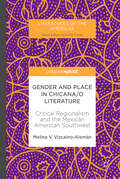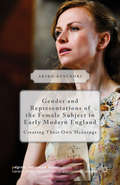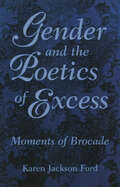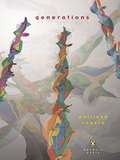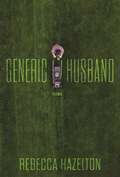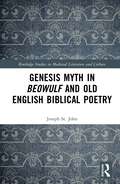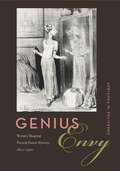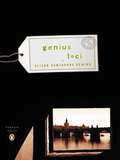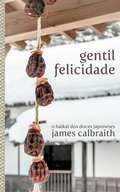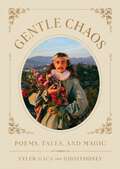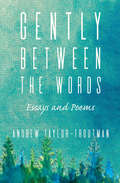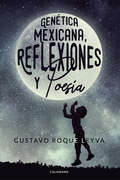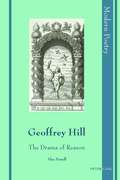- Table View
- List View
Gender and Place in Chicana/o Literature: Critical Regionalism and the Mexican American Southwest (Literatures of the Americas)
by Melina V. Vizcaíno-AlemánThis book is a study of gender and place in twentieth-century Chicana/o literature and culture, covering the early period of regional writing to contemporary art. Remapping Chicana/o literary and cultural history from the critical regional perspective of the Mexican American Southwest, it uncovers the aesthetics of Chicana/o critical regionalism in the writings of Cleofas Jaramillo, Fray Angélico Chávez, Elena Zamora O’Shea, and Jovita González. In addition to bringing renewed attention to contemporary writers like Richard Rodriguez and introducing the work of Chicana artist Carlota d.Z. EspinoZa, the study also revisits the more recognized work of Américo Paredes, Mario Suárez, Mary Helen Ponce, and Rodolfo “Corky” Gonzales to reconsider the aesthetics of gender and place in Chicana/o literature and culture.
Gender and Representations of the Female Subject in Early Modern England: Creating Their Own Meanings (Palgrave Shakespeare Studies)
by Akiko KusunokiThis book examines the interactions between social assumptions about womanhood and women's actual voices represented in plays and writings by authors of both genders in Jacobean England, placing the special emphasis on Lady Mary Wroth.
Gender and the Poetics of Excess: Moments of Brocade
by Karen Jackson FordThe argument posed in this analysis is that the poetic excesses of several major female poets, excesses that have been typically regarded as flaws in their work, are strategies for escaping the inhibiting and sometimes inimical conventions too often imposed on women writers. The forms of excess vary with each poet, but by conceiving of poetic excess in relation to literary decorum, this study establishes a shared motivation for such a strategy. Literary decorum is one instrument a culture employs to constrain its writers. Perhaps it is the most effective because it is the least definable. The excesses discussed here, like the criteria of decorum against which they are perceived, cannot be itemized as an immutable set of traits. Though decorum and excess shift over time and in different cultures, their relationship to one another remains strikingly stable. Thus, nineteenth-century standards for women's writing and late twentieth-century standards bear almost no relation. Emily Dickinson's do not anticipate Gertrude Stein's or Sylvia Plath's or Ntozake Shange's. Yet the charges of indecorousness leveled at these women poets repeat a fixed set of abstract grievances. Dickinson, Stein, Plath, Jayne Cortez, and Shange all engage in a poetics of excess as a means of rejecting the limitations and conventions of “female writing” that the larger culture imposes on them. In resisting conventions for feminine writing, these poets developed radical new poetries, yet their work was typically criticized or dismissed as excessive. Thus, Dickinson's form is classified as hysterical, and her figures tortured. Stein's works are called repetitive and nonsensical. Plath's tone is accused of being at once virulent and confessional, Cortez's poems violent and vulgar, Shange's work vengeful and self-righteous. The publishing history of these poets demonstrates both the opposition to such an aesthetic and the necessity for it.
Generations
by Pattiann RogersPattiann Rogers, one of America’s finest contemporary poets, has won a reputation for densely detailed, thickly textured poems describing the natural world and one’s place in it that are informed by a broad knowledge of science. In the tradition of Emerson, Whitman, and A. R. Ammons, Rogers’s wise and complex poems read like a series of witty but deeply felt explorations of the physical world and the presence of the divine, exuding much observational care and descriptive panache. Her new collection, Generations, consists of fifty-four poems that concern themselves not just with the notion of the generations of life, but “generations” in the sense of energy, change, replication, and continuity—the entire process of coming or bringing into being. .
Generations
by Pattiann RogersPattiann Rogers, one of America's finest contemporary poets, has won a reputation for densely detailed, thickly textured poems describing the natural world and one's place in it that are informed by a broad knowledge of science. In the tradition of Emerson, Whitman, and A. R. Ammons, Rogers's wise and complex poems read like a series of witty but deeply felt explorations of the physical world and the presence of the divine, exuding much observational care and descriptive panache. Her new collection, Generations, consists of fifty-four poems that concern themselves not just with the notion of the generations of life, but "generations" in the sense of energy, change, replication, and continuity--the entire process of coming or bringing into being.
Generic Husband: Poems
by Rebecca HazeltonGeneric Husband presents a queer take on an old, beloved, and troublesome subject: the husband. While the “generic husband” of the cultural imagination has remained relatively static, the reality of the husband in contemporary marriage proves multidimensional and complex. Alternatively tender and bitingly funny, Rebecca Hazelton’s poems unpack the inequities created by gender, power, and patriarchal legacies, unraveling what a “husband” can be, both personally and culturally.
Genesis Myth in Beowulf and Old English Biblical Poetry (Routledge Studies in Medieval Literature and Culture)
by Joseph St. JohnGenesis Myth in Beowulf and Old English Biblical Poetry explores the adaptation of antediluvian Genesis and related myth in the Old Testament poems Genesis A and Genesis B, as well as in Beowulf, a secular heroic narrative.The book explores how the Genesis poems resort to the Christian exegetical tradition and draw on secular social norms to deliver their biblically derived and related narratives in a manner relevant to their Christian Anglo-Saxon audiences. In this book it is suggested that these elements work in unison, and that the two Genesis poems function coherently in the context of the Junius 11 manuscript. Moreover, the book explores recourse to Genesis-derived myth in Beowulf, and points to important similarities between this text and the Genesis poems. It is therefore shown that while Beowulf differs from the Genesis poems in several respects, it belongs in a corpus where religious verse enjoys prominence.
Genius Envy: Women Shaping French Poetic History, 1801–1900
by Adrianna M. PaliyenkoIn Genius Envy, Adrianna M. Paliyenko uncovers a forgotten history: the multiplicity and diversity of nineteenth-century French women’s poetic voices. Conservative critics of the time attributed the phenomenon of genius to masculinity and dismissed the work of female authors as "feminine literature." Despite the efforts of leading thinkers, critics, and literary historians to erase women from the pages of literary history, Paliyenko shows how these female poets invigorated the debate about the origins of genius and garnered considerable recognition in their time for their creativity and bold aesthetic ideas.This fresh account of French women poets’ contributions to literature probes the history of their critical reception. The result is an encounter with the texts of celebrated writers such as Marceline Desbordes-Valmore, Anaïs Ségalas, Malvina Blanchecotte, Louisa Siefert, and Louise Ackermann. Glimpses at the different stages of each poet’s career show that these women explicitly challenged the notion of genius as gender specific, thus advocating for their rightful place in the canon.A prodigious contribution to studies of nineteenth-century French poetry, Paliyenko’s book reexamines the reception of poetry by women within and beyond its original context. This balanced and comprehensive treatment of their work uncovers the multiple ways in which women poets sought to define their place in history.
Genius Loci
by Deming Alison HawthorneFrom a poet and essayist whose writing about nature has won her comparisons with Gary Snyder and Terry Tempest Williams comes a new collection that offers further evidence of her ability to trace the intersections of the human and nonhuman worlds. The title poem is a lyrical excavation of the city of Prague, where layers of history, culture and nature have accumulated to form "a genius loci"-a guardian spirit. From "Genius Loci" Return to a place where nothing in particular can be seento explain why you return, nothing you can name, though you can touch the memory of the landscape-linden trees in a hedgerow, cut wheatfield, ruins of the longhouse, rolling meadow of sunflowers blooming, the musk of their oil, contained heat.
Gentil Felicidade
by Flávio Ferreira Marinho James CalbraithQuer como um ingrediente crucial da cerimônia do chá, um elemento importante dos rituais do santuário, ou simplesmente como um meio para refrescar-se durante o verão japonês escaldante, doces são tão centrais para a vida e cultura japonesa como a poesia ou a jardinagem. Para mim, eles também têm sido uma maneira de experimentar esta cultura - e algumas das minhas melhores recordações do Japão são de uma forma ou de outra relacionadas com sua diversidade. Uma noite de verão, do nada, comecei a escrever haicais sobre essas memórias. Acabei com setenta pequenos poemas - o suficiente para colocar todos juntos neste livreto. Poesias e doces O que mais um sábio necessita Nessa noite de verão
Gentle Chaos: Poems, Tales, and Magic
by Tyler GacaFrom the wild imagination of Tyler Gaca, also known as TikTok's Ghosthoney, comes a beautiful compendium of poems, images, personal stories, and vignettes that explore magic, queerness, Tyler&’s unique story, and the enchantment and comfort to be found in the weird, the dark, and the different. In this raw yet enchanting collection of poems, essays, photographs, and artworks, Tyler Gaca dreamily navigates themes of magic and queerness, offering readers an intimate look inside his mind and his worlds, real and imagined. The writings in Gentle Chaos reflect on growing up queer and in love with magic, discovering yourself and your place in the world, and daring to seek out love and hope. The artworks are dedicated to salvaged antique photographs, haircuts, dead moths, the creatures we dream up, and much more. The result is a whimsical, vulnerable, and transporting journey into the gentle chaos within us all.
Gently Between the Words: Essays and Poems
by Andrew Taylor-TroutmanGently Between the Words guides and instructs our heartsIn his latest collection of essays and poems Taylor-Troutman guides readers through seemingly simple stories of death, life, parenting struggles, successes and failures that speak to larger questions we all face: How do we best spend our time? How can we raise our kids to be kind and confident? Who gives us guidance and wisdom? What does love look like in our lives on a day-to-day basis?In simple and important gestures like cleaning spilled milk with toilet paper, flipping the perfect pancake with your partner, and walking down the beach with your young child, readers find universal truths to guide their own lives regardless of personal circumstances.Gently Between the Words guides and instructs our hearts to keep the endangered language of beauty, love, forgiveness, grace, and sensitivity alive in order that we all might become more and more necessary to the urgency of our times and the dreams of our children. —Jaki Shelton Green, NC Poet Laureate
Genética Mexicana, Reflexiones y Poesía
by Gustavo Roque LeyvaCierro los ojos y busco tu mirada por el camino de la esperanza. La riqueza de México está en su gente. ¿Quién te reconducirá? Una mirada interior con procesos mentales nuevos escribirá el pensamiento azteca con el vergel reconstruido, donde reaparezca el canto del Cenzontle. La inspiración reedificará letras de amor, interpretadas en las alas del alba. Con la ternura que enseña la montaña y la reflexión universal, la imaginación renacerá; colgados de la luna, con el canto de la alondra, el mirlo o cualquier ave excepcional, hasta poemas de amor se escribirán para conquistar el territorio espiritual más preciado: tu corazón.
Geoffrey Hill: The Drama Of Reason (Modern Poetry Series #9)
by Alex PestellGeoffrey Hill (1932-2016) was often hailed as one of the most important - and one of the most difficult - poets of his lifetime. This book is a timely investigation into a writer whose work seems simultaneously to invite analysis and to refuse explanations of its sensuous, allusive language. <P><P> It provides an introduction to Hill's work for readers coming to it for the first time and offers an account of his poetics that will be of interest to his more experienced readers. Alongside many close readings of poems spanning Hill's long and varied career, the author brings to light findings from the Geoffrey Hill Archive in Leeds and investigates the poet's important critical writings. <P><P>Hill's often antagonistic engagement with the thought of other poets and philosophers supplies the book's structure. Coleridge, Eliot, F. H. Bradley and Ezra Pound are engaged by Hill in a dramatic contest over what the author claims is his visionary aim for poetry: the realisation of the objective conditions of judgement. <P><P>Above all, Hill is presented as a quintessentially modernist poet - at odds with modernity, and at the same time creating a language answerable to its rich, traumatic complexity.
Geoffrey of Monmouth's Life of Merlin
by Mark Walker Dilip Sarkar Geoffrey MonmouthFor the first time in English, Mark Walker presents a verse translation of the twelfth-century epic poem by Geoffrey of Monmouth, the originator of many of the Arthurian legends familiar to us today. Here is the original Merlin - a mysterious and mad character inspired by ancient Welsh legends. But he is also a king, a prophet, and a modern Renaissance man. This brand-new translation casts Geoffrey's Latin into accessible English hexameter verse, giving readers a feel for the rhythms of the original. The extensive introduction sets the poem in the context of Geoffrey's life and writings, while each chapter opens with helpful background material. Turn back the pages of time and discover the mythical, magical world of the original Merlin.
Geografías
by Mario BenedettiPocas veces se ha conseguido como en este libro recrear con tanta ternura, con tanto sentido del humor y tanta penetración un universo cotidiano a menudo traspasado por las lanzadas del sufrimiento. Las búsquedas poéticas y los recursos narrativos aparecen con frecuencia entrelazados en las obras de Mario Benedetti. En Geografías, libro íntegramente redactado durante su exilio español, el autor reúne catorce cuentos y otros tantos poemas, agrupados en dúos afines, colocando cada uno de esos pares bajo el resguardo de un membrete geográfico.
Geography III
by Elizabeth BishopWhether writing about waiting as a child in a dentist's office, viewing a city from a plane high above, or losing items ranging from door keys to one's lover in the masterfully restrained "One Art," Elizabeth Bishop somehow conveyed both large and small emotional truths in language of stunning exactitude and even more astonishing resonance. As John Ashbery has written,"The private self . . . melts imperceptibly into the large utterance, the grandeur of poetry, which, because it remains rooted in everyday particulars, never sounds 'grand,' but is as quietly convincing as everyday speech. "
Geopoetry: Geology, Materiality, Ecopoetics (Recencies Series: Research and Recovery in Twentieth-Century American Poetics)
by Dale EnggassAt its core, geopoetics proposes that a connection between language and geology has become a significant development in post–World War II poetics. In Geopoetry, Dale Enggass argues that certain literary works enact geologic processes, such as erosion and deposition, and thereby suggest that language itself is a geologic––and not a solely human-based––process. Elements of language extend past human control and open onto an inhuman dimension, which raises the question of how literary works approach the representation of nonhuman realms. Enggass examines the work of Clark Coolidge, Robert Smithson, Ed Dorn, Maggie O&’Sullivan, Jeremy Prynne, Jen Bervin, Christian Bök, and Steve McCaffery, and he finds that while many of these authors are not traditionally connected to ecocritical writing, their innovations are central to ecocritical concerns. In treating language as a geological material, these authors interrogate the boundary between human and nonhuman realms and offer a model for a complex literary engagement with the Anthropocene.
Georg Trakl's Poetry: Toward a Union of Opposites
by Richard DetschThe chaotic mixture of elements in Trakl's poems is more apparent than real, this book argues, thus challenging the "Orphic" view of Walther Killy and his followers. A dream of unity—one of the most ancient dreams in human history—is in fact reflected in all of Trakl's work.The recurring themes in Trakl's poetry are brought into focus through Dr. Detsch's literary, psychological, and philosophical analysis: the union of male and female in incest from the Jungian standpoint, the union of life and death from the Heideggerian standpoint and that of German Romanticism as represented by Novalis, the union of good and evil from the Dostoyevskian or Nietzschean standpoint, the mixture of images from the Goethean definition of symbolism.Trakl (1887–1914) is presented as a poet whose lyric voice sounded a cry of hope in its deepest despair. As Dr. Detsch's generous quotations from the poet's work (in the original German) make clear, Georg Trakl sought poetic expression for a union of opposites.
George Bowering: Selected Poems 1961-92
by George BoweringGeorge Bowering's poetic output has slowed since the early 1980s, when he began to devote his prolific and versatile imagination almost exclusively to prose fiction. Nevertheless, the 31 years encompassed by George Bowering Selected saw the publication of 28 volumes of verse--a substantial output by anyone's standards. Gleaning a single coherent selection from this immense oeuvre would seem to be an impossible task, but George Bowering Selected comes very close to providing an ideal survey. Bowering's poetics is one of speed and constant postmodern play--with words, with ideas, and with perceptions. His poetry's emphasis on the rapidity of thought and of the process of reading means that his books are not easily trimmed into anthology pieces. Instead of spending months with a few choice lyrics, the reader who wishes to come to terms with Bowering must methodically work through the poems at length, and George Bowering Selected is structured to facilitate this style of reading. There are plenty of short, Creeley-like lyrics here, representing the early and late periods of Bowering's career, but the core of the book is the three long serial poems that are presented in full: At War with the U.S., Allophanes, and his masterpiece, The Kerrisdale Elegies. The last may be his most "poetic" poem, but its motion and concerns are quintessential Bowering. George Bowering Selected is quite simply the best available introduction to the work of this difficult and inventive poet. Don't dabble; read it from cover to cover. --Jack Illingworth
George Crabbe: Everyman Poetry
by Stephen DerryA selection of poems by George Crabbe, edited by Stephen Derry
George Crabbe: Everyman's Poetry
by Stephen DerryA selection of poems by George Crabbe, edited by Stephen Derry
George Eliot, Poetess
by Wendy S. WilliamsThe position of George Eliot’s poetry within Victorian poetry and within her own canon is crucial for an accurate picture of the writer, as Wendy S. Williams shows in her in-depth examination of Eliot’s poetry and her role as poetess. Williams argues that even more clearly than her fiction, Eliot’s poetry reveals the development of her belief in sympathy as a replacement for orthodox religious views. With knowledge of the Bible and a firm understanding of society’s expectations for female authorship, Eliot consciously participated in a tradition of women poets who relied on feminine piety and poetry to help refine society through compassion and fellow-feeling. Williams examines Eliot’s poetry in relationship to her gender and sexual politics and her shifting religious beliefs, showing that Eliot’s views on gender and religion informed her adoption of the poetess persona. By taking into account Eliot’s poetess treatment of community and motherhood, Williams suggests, readers come to view her not only as a writer of fiction, an intellectual, and a social commentator, but also as a woman who longed to nurture, participate in, and foster human relationships.

